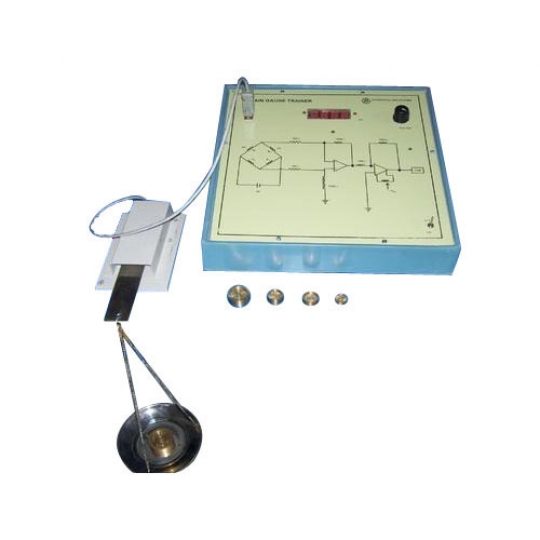 lab@motestainstruments.com | Civil and Mechanical Engineering Lab Equipments India China
lab@motestainstruments.com | Civil and Mechanical Engineering Lab Equipments India China

Code: MOT-MCL-0008
Strain Gauge Trainer.
This is a compact, selfâ€contained, benchâ€top trainer that shows and compares how resistance
strain gauges work and how they measure strains in different structures.
Experiments
Introduction to the equipment and the different bridge connections (quarter, half and fullbridge)
Strains and stresses in a bending system
Strains and stresses in a torsion system
Strains and stresses in a tension system, Poisson’s ratio and Young’s modulus
Tensile strains and stresses in different materials (with optional tensile specimens) and
comparison of Poisson’s ratio and Young’s modulus
Comparison of different strain measurement systems and how they could measure force
Specifications
Sets of masses: The large mass set gives weights from 0.5 kg to 10 kg in a range of units. The
small mass set gives weights from 10 g to 500 g in 10 g units.
Dummy resistors: Set of three 350 Ohm high precision resistors that match the strain gauges
Strain display:
Multiline display that shows:
• Bridge output voltage (μV)
• Strain reading in microâ€strain (με)
• Active arms (gauges)
• Gauge factor
Strain systems:
Bending system: Four standard gauges fitted to a given datum on a steel beam, fixed as a
cantilever. Nominal beam crossâ€section is 5 mm x 20 mm.
Torsion system: Two sets of identical 45â€degree shear/torque strain gauge rosettes fitted to a
torsion bar. Nominal bar diameter is 10 mm.
Tension system: Two sets of identical 90â€degree ‘Tee’ strain gauge rosettes fitted to a tensile
test specimen. Steel specimen supplied as standard. Nominal tension specimen crossâ€section is
2 mm x 10 mm.